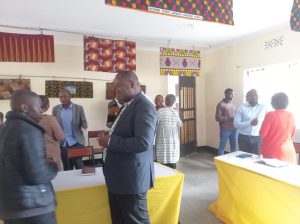March, 2025 - Update #1
Small Stories from the Arusha, Especially Project in March 2025
On March 10th, FSEA’s newest four-year development project for the education of deaf and hard-of-hearing students was launched. This time, the focus is on strengthening the expertise of digital technology mentor teachers in three secondary schools. The goal is for secondary school teachers to learn how to use digital technology to support differentiated instruction and, of course, especially to assist deaf and hard-of-hearing students.
In previous projects, the main focus has been on supporting the schooling of children with hearing impairments in primary education, and the results have been excellent. However, the educational path has often ended at primary school, as secondary education for students with hearing impairments has been hindered by a lack of sign language interpreters, pedagogical practices, ICT equipment, and teacher training. The participating schools are Patandi Maalum and Themi Secondary Schools, as well as Arusha Technical College (ATC).
Of course, the project has been prepared in various ways beforehand, but Monday, March 10th, was a moment of celebration: the first day of mentor training (another celebration followed the next day when the mentors received their promised laptops). The in-person training will continue for two weeks this time, and even beyond that, with various smaller online training sessions planned. Since describing such a large project as a whole is challenging, I decided to share different events and experiences from these two weeks.
I have not previously been actively involved in the project (well, to some extent), and this is my first time in Tanzania and participating in the project’s activities here. My role is to support the project by assisting in its evaluation and implementing regular internal assessments.

The mentors from the three schools met for the first time today at the Meru Primary School Deaf Unit. The picture captures the first exercise: a cocktail party-style introduction, a method we have used in many training sessions. (In the picture, mathematics teachers Reginald Lekule Elias and Mathew Tweve.) Each participant talked with a stranger for three minutes, then switched to a new conversation partner, and repeated this twice more. This initiated the networking process, which will hopefully be beneficial and supportive in their future work in their respective schools. The day’s program was mainly about getting started, introducing the concept of mentoring, and initiating discussions within the schools.
It has been truly touching to see how dedicated these future mentors, the participating sign language interpreters, and other project contributors are. The selected mentors are teachers from different fields; they also have special education qualifications and have experience teaching deaf, hard-of-hearing, and other students with disabilities.
I spoke with Paul A. Njile, a biology and chemistry teacher, who emphasized that all students have the right to learn theoretical subjects, not just traditional vocational skills, which is often the path deaf and hard-of-hearing students are directed towards after primary school.
On the first day, a young man also visited, who has successfully completed primary school with the help of digital technology and is now studying to become a special education teacher. After his touching speech, I happened to praise his teachers—without knowing that two of them were among the future mentors present at the session.
Here, one can clearly see the impact of skilled and encouraging teachers!
These are my reflections on the first evening of the project.
Liisa Ilomäki